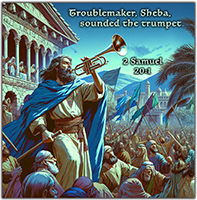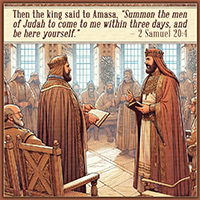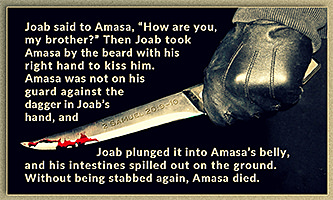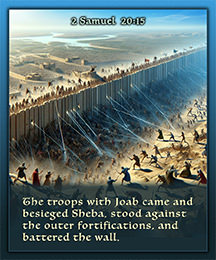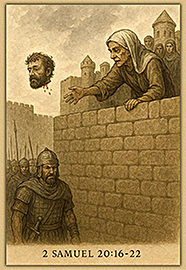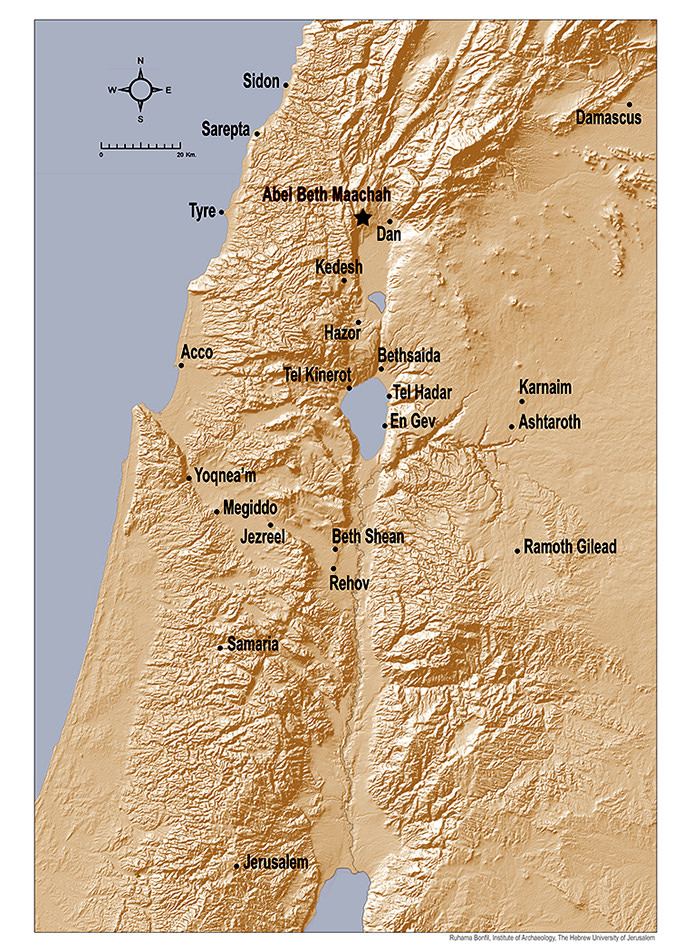2 Samuel 20:1–26 . . . Bible Study Summary with Videos and Questions
“Sheba the Benjamite Rebels Against David”
Chapter 20 introduces us to a trouble-making man named Sheba. Appearing only in this chapter, he’ll actively revolt against King David who’ll order military strong-arm, Abishai, to pursue Sheba. Joab will join the expedition, thereafter treacherously putting Amasa, an army commander, to death. Joab will lay siege to Abel Beth Maakah (meaning “Meadow of the House of Oppression”); its townspeople will cut off Sheba’s head and throw it from a wall, down toward Joab’s feet.
[Note: Click the link to This Week’s Passage near the bottom of this page to read today’s Scripture.]
A Great Divide: Israel vs. Judah (2 Samuel 20:1–7)
Chapter 19 ends with two nations quarreling over their king. The squabble between the leaders of the ten northern tribes of Israel and the leaders of the single tribe of Judah continues in chapter 20 with a focus on which nation apparently honored David more. Clearly, the Israelites’ response to Sheba’s rebellion showed that their desire to honor David as king had nothing to do with esteeming him, but in exalting self.
This quarrel was interrupted by Sheba, a Benjamite. Depending on the Bible version, the author informs us that Sheba was a “worthless fellow,” “troublemaker,” “scoundrel.” (The text literally reads “son of belial,” characterized as wicked or worthless.) In effect, Sheba was a “no-goodnik.” But in the heat of this argument he lost his temper (or saw an opportunity to assume leadership there) and blurted out the following:
“We have no share in David, no part in Jesse’s son! Every man to his tent, Israel!” (2 Sam. 20:1b)
That’s all it took for his fellow-Israelites to turn on their heels and leave with him. And so their once-joyful victory procession turned sour with a bitter debate becoming a major schism. One moment these Israelites claimed David as their leader; the next they were following worthless Sheba. David hadn’t even reached Jerusalem, yet his kingdom had already become a divided one. It looked as though he was starting over again as king of only the tribe of Judah.
Sheba sounded a trumpet to get the people’s attention and then shouted his inflammatory words, shown above in v. 1b. “Every man to his tent,” means, Let’s all go home. So all the men of Israel deserted David to follow Sheba, son of Bicri. But the men of Judah stayed by their king, all the way from the Jordan to Jerusalem. The desertion of the ten tribes was distressing to David but the loyalty of the men of Judah was wonderful. For us today, when others desert or divide, we have an opportunity to demonstrate loyalty. We should imitate the loyalty that Judah showed to its king by being loyal to Jesus in spite of the mocking of others, in spite of the rebellion of the flesh, and in spite of the times when the Lord seems distant.
David’s escort by the northern tribes of Israel evaporated; he had no choice but to return to Jerusalem, escorted only by his own Judaean tribe. As you can imagine, unity of his kingdom was now in serious doubt. In vv. 4–5, David told Amasa to marshal an army to deal with Sheba’s rebellion. Amasa was Absalom’s former general. David made him the commander of his army as a conciliatory move, after Absalom died.
The first thing David did after arriving in Jerusalem was deal with his ten wives or concubines that he’d left behind to keep house (v. 3). He confined all ten who’d remained there to minister at the palace till they’d die, living as widows. Previously, Absalom had intentionally slept with these women in public; there was no way David could return to the way things were; he’d never sleep with any of these women again.
The next item of business for David was to quash the rebellion that was under way, led by Sheba. He didn’t dare allow Sheba time to gather a following, organize an army, and find fortified cities in which to hide or from which to fight. Knowing that speed was of the essence, David moved quickly to put down Sheba’s rebellion, summoning his new commander, Amasa, and instructing him to muster Judah’s military forces to pursue and subdue Sheba, as quickly as possible. When Absalom had the chance to quickly crush David, he didn’t take advantage of the opportunity. So, David didn’t want to make that same mistake with Sheba. He told Amasa, “Summon the men of Judah” (v. 4, enlarge photo right), that is, the Judaean militia, “within three days, and be here yourself.” Given the slowness of communication in those days, that “three-day” order amounted to David expecting a “lightning response” from Amasa.
This was Amasa’s first assignment under King David’s direction, but he wasn’t up to the job David had given him. He wasn’t a completely competent military man, and Joab (the former commander of David’s army) defeated Amasa soundly when they fought together. For no apparent reason, when Amasa went to summon the troops of Judah, he didn’t meet David’s three-day deadline (v. 5). The situation was dire for David who wouldn’t ask Joab to do the job because that would appear to be an admission that he’d erred in firing Joab whom he’d replaced with Amasa.
Tired of waiting, David sent his royal guard, giving orders to Abishai who was the commander over “the mighty warriors” — David’s personal guard (v. 7). So he turned to Abishai, the general, Joab’s brother, ordering him to lead David’s personal army and the Philistine mercenary troops north, from Jerusalem, to put down Sheba’s rebellion. Joab was the field commander of these troops, but Abishai was in command over him. When Abishai left Jerusalem, leading David’s select warriors in pursuit of Sheba, Joab went along in this pursuit under Abishai’s command.
Joab Deceptively Murders Amasa (vv. 8–10a)
Seeing in v. 8 that “Amasa came to meet them,” we need to realize that Amasa hadn’t assembled the army of Judah quickly enough, but he didn’t want to be left out of the battle. So he joined the troops loyal to David at Gibeon. By the time Abishai’s troops got as far as Gibeon — about seven miles north of Jerusalem — Amasa’s forces from Judah joined them. As they approached each other, Joab greeted him as a friend; Amasa was his cousin, after all. His greeting seemed warm and friendly (“my brother,” v. 9), so Amasa wasn’t on his guard. Joab was in a military uniform that included a belt and a sheath that held his dagger. Somehow (it doesn’t appear to be deliberate), as Joab moved forward, the dagger fell out of its sheath, so he bent down and picked it up, using his left hand.
Amasa apparently didn’t notice the knife that Joab held in his hand as they drew near one another. Perhaps Joab sized up the situation and realized how easy it would be for him to kill Amasa. And so he did that, approaching Amasa with cunning and deception.
Holding a man’s beard (v. 9) was a sign of a friendly welcome, apparently the usual way one would hold onto the man being kissed. The empty sheath made it seem that Joab was unarmed. As he grasped Amasa with his right hand, he ran him through with his left hand, probably twisting his knife into his abdomen, causing his innards to spill out (v. 10). Joab showed how ruthless he was by murdering Amasa, the man who replaced him as commander of David’s armies. He did that out of both rivalry and concern that Amasa wasn’t genuinely supportive of David. Amasa died on the spot!
Seemingly, almost immediately, Joab turned and walked away, along with his brother Abishai, to resume their pursuit of Sheba. From what the text tells us, it doesn’t appear as though Joab intended anything more than to kill Amasa. The author doesn’t suggest that Joab sought to take control of David’s army; we’re told only that he set out to continue his pursuit of Sheba (v. 10b).
Joab Pursues Sheba (vv. 10b–22)
For all his ruthless devotion to David, Joab was a true leader. The soldiers naturally followed the commander who’d successfully led them many times before.
Without missing a beat, “Joab and his brother Abishai” lead the army north, in pursuit of Sheba, son of Bicri. As chief commander Amasa wallowed in his blood in the middle of the road (v. 12), we see that Abishai yielded to his impetuous brother’s leadership while David would no longer attempt to restructure his military. One of Joab’s men shouted to the Judaean troops, “Whoever favors Joab, and whoever is for David, let him follow Joab!” But instead of following, everybody stopped to gawk at the body, rubbernecking as people do on the freeway as they pass a gruesome auto accident. Seeing that all of the troops came to a halt when they saw Amasa’s body, one of Joab’s men dragged it from the road, laying it onto an adjacent field, throwing a garment over it. Once it was removed from the center of the road, all the men marched on dutifully. The chase was on and the Judaeans followed Joab north on their mission (v. 13).
Meanwhile, Sheba was traveling through all the tribal areas in front of him, trying to gain support. Joab, accompanied by his army, began to make a sweep through the land of Israel in search of Sheba. The author tells us that “Sheba passed through all the tribes of Israel to Abel Beth Maakah” (v. 14). This means that all Israel was aware that David was pursuing Sheba. Because he had no organization, Sheba was ineffective. But he did his best to turn people away from David, toward his leadership. He had a three-to-four-day head start, however, Joab’s troops were hot on his trail. For a short time, Sheba found shelter in the walled city of Abel (see enlarged map), in the far north of Israel’s territory.
King David had feared that Sheba would find refuge in a fortified city, which eventually came to pass. Nevertheless, Joab began a siege of that city, building a siege ramp that would allow his men to set up a battering ram to pulverize the city’s stone wall and create a breach therein (v. 15, enlarge photo left). The people inside the city didn’t know why their city was under attack, but they looked on with fear as Joab and his men began to dismantle the walled city, piece by piece. It would be only a matter of time before he’d break through the wall and enter the city. At that point, not only would Abel be destroyed by Joab and his men, but many people would likely die in the confrontation.
If its residents couldn’t find a way to resolve the situation, everyone in Abel would likely be slain because they’d harbored a traitor who opposed the king. The negotiator for the city of Abel turned out to be a “wise woman” (v. 16) who went atop the wall, called down, and asked to speak to Joab. He came near and she recounted to him how this city had been highly esteemed as a source of wisdom and counsel; it was a place known for ending disputes. Why then would Joab want to destroy such a place?
This gives us some indication of how women were sometimes able to function at a high level within the culture in those days. Siege warfare was a terrible ordeal for the citizens of a besieged city. This wise woman was smart enough to seek a speedy end to the struggle. She said that they’d done nothing to deserve what Joab was dishing out. She told Joab directly, “We are the peaceful and faithful in Israel. You are trying to destroy a city that is a mother in Israel. Why do you want to swallow up the Lord’s inheritance?” Verse 19’s “The inheritance of the Lord” refers to the nation Israel. Would Joab have intended to take responsibility for destroying “the Lord’s inheritance”?
Joab assured the woman that he didn’t wish to destroy the city. He then informed her why the city was being besieged: They were seeking only one person, Sheba the son of Bicri, who was guilty of rebellion against King David. If the woman would arrange to have this man handed over to them, they’d go their way in peace. That was the start of negotiations between this wise woman and Joab who explained that they had nothing against the citizens of that city, and that it was only Sheba whom they sought. If he was turned over to Joab’s forces, they’d lift the siege and leave her city. The woman responded: “His head will be thrown to you from the wall” (v. 21c).
The wise woman went to talk with all the people to hopefully convince them to execute Sheba who probably thought he was safe within the walls of that city; but no one is safe when they run against Yahweh’s will. There isn’t a wall high enough or strong enough to protect people or nations against God’s will. Within a short time, Sheba’s head was thrown down to Joab and his men. As a result, he sounded the trumpet that signaled the end of that battle and Sheba’s rebellion; the troops dispersed. In full command of the army once again, Joab returned to Jerusalem in victory. It would take years of careful diplomacy to regain the full loyalty of the twelve tribes. But for now, the rebellion was over. Once again, King David was in charge of his capital city.
The wise woman contrasts with foolish Joab who, nonetheless, showed wisdom himself when he listened to and cooperated with the woman. So ended the rebellion of Sheba. Yet the division between Judah and the other ten tribes of Israel would remain. After Solomon’s eventual death, there was a civil war that permanently divided the united kingdom into two nations: the southern Kingdom of Judah and the northern Kingdom of Israel.
David’s Second Administrative Report (vv. 23–26)
The essence of this latest report should focus only on Joab. What irony! Though he gained the position of commander over all the army of Israel through murder, David allowed him to take full control. Looking back, Joab had joined David while he was fleeing from Saul (see 1 Sam. 22:1–2; 26:6). It was he and Abner who faced off in some kind of he-man contest, resulting in a number of deaths, including the death of his youngest brother, Asahel (2 Sam. 2). In retaliation against Abner, who killed Joab’s brother in battle, Joab deceitfully killed him. For this he was strongly rebuked by David (2 Sam. 3).
It’s doubtful that David would have ever chosen Joab as the commander of his army, but he offered this position to whomever would first attack the city of Jebus; Joab took him up on this offer (1 Chronicles 11:4–6). It was also Joab who manipulated David into bringing Absalom back to Israel, then giving him his freedom (2 Sam. 14). And it was Joab who put Absalom to death, in spite of David’s command to the contrary (2 Sam. 18). While there’s no apparent reason why David replaced Joab with Amasa, the real wonder is that after Joab put Amasa to death, he remained commander of the army. We’d never have expected chapter 20 to end as it does in light of what we see in chapter 19, beginning with v. 13, shown here.
Finally, we’re told about Benaiah … Adoniram … Jehoshaphat … Sheva … Zadok and Abiathar … Ira the Jairite: The greatness of David’s kingdom wasn’t built on David’s abilities alone. He knew how to assemble and lead an effective, hearty team.
† Summary of 2 Samuel 20:1–26
These twenty-six verses narrate the outbreak and resolution of another rebellion against King David, this time led by Sheba son of Bichri, a Benjamite. After the dispute between Judah and Israel during David’s return to Jerusalem, Sheba seizes the moment, calling the northern tribes to abandon David, and many Israelites follow him while Judah remains loyal (20:1–2). David returns to his palace and takes care of administrative and moral matters, placing the ten concubines he’d left behind under guarded seclusion for the rest of their lives (v. 3). David then orders Amasa, the newly appointed army commander, to assemble the troops within three days to pursue Sheba, but Amasa delays (vv. 4–5). In response, David sends Abishai with Joab’s men, the Cherethites, and the Pelethites to give chase (vv. 6–7). On the march, Joab treacherously murders Amasa, reclaiming command of the army, and the pursuit of Sheba continues (vv. 8–13).
Sheba takes refuge in the fortified city of Abel Beth Maacah, but Joab’s forces besiege the city (v. 15). A wise woman from the city negotiates with Joab, convincing him to spare the inhabitants if they deliver Sheba. She assures Joab of the city’s peaceful status and proposes to eliminate the rebel herself (vv. 16–21). The citizens then execute Sheba by beheading him and throw his head over the wall to Joab (v. 22). The siege ends, and Joab returns to Jerusalem to serve as David’s military commander (v. 23). The passage concludes with a list of David’s key officials, showing the restored order in the kingdom after this brief yet dangerous civil crisis (vv. 23–26).
Key points with verse references:
• Sheba son of Bichri incites the northern tribes to reject David’s rule, and Israel follows him while Judah remains faithful (vv. 1–2).
• David returns to Jerusalem, secludes the ten concubines he left behind, and orders Amasa to assemble the army within three days, but Amasa delays (vv. 3–5).
• Joab murders Amasa in a deceptive encounter and resumes command of the army as they pursue Sheba (vv. 8–13).
• A wise woman of Abel Beth Maacah negotiates with Joab to save her city by handing over Sheba, who gets executed by the townspeople (vv. 16–22).
• Joab returns to Jerusalem as commander, and a list of David’s officials is recorded, reflecting the restoration of order (vv. 23–26).
This account reveals the fragility of unity in Israel after Absalom’s rebellion and the mix of wisdom, brutality, and decisive leadership needed to maintain the throne.
This Week’s Passage
2 Samuel 20:1–26
New International Version (NIV) [View it in a different version by clicking here; also listen to chapter 20 narrated by Max McLean.]
Summary Video: “The Second Book of Samuel”
† Watch this introductory video clip created by BibleProject on bibleproject.com.
- Q. 1 In what ways do events in the previous chapter (especially 19:41–43) fuel Sheba’s revolt (vv. 1–2)?
- Q. 2 Could it be that Joab catching Amasa’s beard is the origin of the refrain, “I’ve caught you by the hair on your chinny-chin-chin”?
- Q. 3 Why would “all the people” (v. 22), among whom were Sheba’s own followers, behead him?

